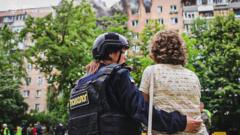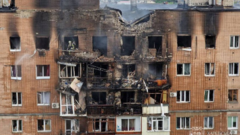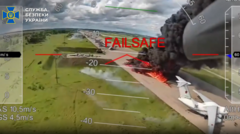With nearly 16,000 Ukrainian civilians still in Russian prisons, families fear their plight will be overlooked amidst peace talks. Many relatives are advocating for a clearer framework for the return of these individuals as they navigate the uncertainty of their future and the psychological toll of prolonged captivity.
Families of Ukraine's Captive Civilians Fear Peace Talks Will Overlook Their Loved Ones

Families of Ukraine's Captive Civilians Fear Peace Talks Will Overlook Their Loved Ones
As Ukraine approaches potential peace negotiations, families of those still held in Russian captivity express growing distrust and concern that their loved ones will be forgotten.
In the heart of Bucha, Ukraine, the families of countless civilians still held captive by Russian forces cling to hope even as the prospect of peace talks looms on the horizon. Among them is Tatyana Popovytch, who has tirelessly searched for her son Vladislav since he was taken during the conflict. "He is so vulnerable," she laments, expressing fears for his mental well-being in captivity.
Tatyana, like many others, contacted numerous agencies and explored potential leads, only to receive a glimmer of hope from a released prisoner named Serhii. He recalled hearing Vladislav's voice during roll call while incarcerated in Kursk, providing a brief respite from the agony of uncertainty. Yet, aside from two standard letters from him, sent months apart, Tatyana grapples with the suffocating silence surrounding her son's fate.
Ukrainian authorities estimate that almost 16,000 civilians remain imprisoned by Russian forces, a staggering figure that excludes an estimated 20,000 children reportedly taken to Russia. Amidst the deteriorating situation, families are increasingly worried that their loved ones will be forgotten in the chaotic maneuvering of peace negotiations.
Yulia Hripun, whose father was abducted early in the conflict, emphasizes that discussions surrounding the recovery of civilians are conspicuously absent in official circles. She co-founded an organization with another family member advocating for the release of all civilians, engaging with UN and European officials to raise awareness and seek solutions. The response, however, has been dismaying, often underscoring the lack of understanding of the situation.
Human rights ombudsman Dmytro Lubinets echoes their concerns, admitting the absence of legal frameworks to facilitate the return of civilian detainees. He notes that Russia complicates matters further by filing criminal charges against many captured, claiming that the situation severely hampers any negotiation initiatives.
Despite small prisoner exchanges, such as the release of 120 civilians this past May, many families remain cautiously hopeful yet skeptical about future resolutions. Petro Sereda, whose son Artym has been imprisoned for over three years, understands the bittersweet nature of receiving news; the sound of his son's voice would be a moment of immense joy, yet uncertainty looms.
As families like Tatyana's navigate the harrowing experience of waiting, persistent fears revolve around the psychological toll of captivity. Tatyana remains haunted by the thought of her son's suffering in an environment where he is not only imprisoned but allegedly tortured.
Above all, the resilience of these families shines through as they prepare for their loved ones' potential returns. Tatyana reflects, "It's all I think about. All the time, every day." While the dream of reunion remains their beacon of hope, reality raises a constant banner of profound worry over what they might face upon their return.





















